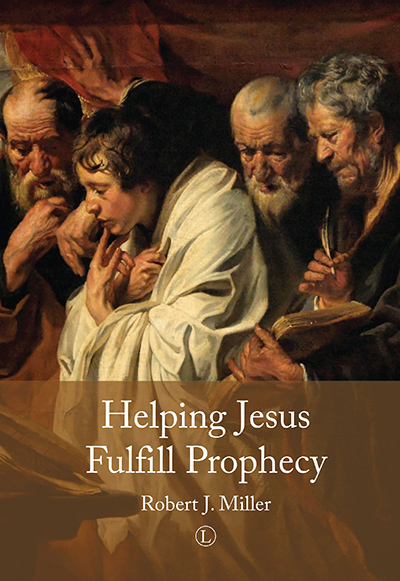Description
It’s obvious that Jesus fulfilled prophecies about the promised Messiah – or so the gospels make it seem. But the real story is more complex, and more compelling. In hindsight, we can see that Jesus had help fulfilling prophecy. The gospel writers skillfully manipulated prophecies – carefully lifting them out of context, creatively reinterpreting them, even rewriting them – to match what Jesus would do in fulfilling them. The evangelists also used the prophecies themselves to shape the very stories that show their fulfillment. Helping Jesus Fulfill Prophecy describes in detail how Christian authors “helped” Jesus fulfill prophecy. Studies of Greek oracles, the Dead Sea Scrolls, translations of the Hebrew Scriptures into Greek and Aramaic, and the writings of Josephus explore the interpretive techniques that paved the way for the New Testament’s manipulation of prophecy. The author analyses how the belief that Jesus fulfilled prophecy became an argument to justify a new notion: the view that Christians had replaced Jews as God’s chosen people. The aggressive anti-Judaism of patristic theologians is analysed in chapters on Justin Martyr and Augustine, who embedded it into the argument from prophecy. The book concludes with an ethical argument for why Christians should retire the argument from prophecy.
Passionately argued and morally lucid, Helping Jesus Fulfill Prophecytraces the apologetic, political, and polemical uses of the idea of prophecy and fulfillment from the scriptures of ancient Israel to the web pages of the modern American megachurches, and issues a fervent appeal for an ethical, reasoned, biblical interpretation. This is a thoughtful must-read for anyone concerned with the moral compass of contemporary Christianity.
About the Author
Robert J. Miller is Rosenberger Professor of Religious Studies and Christian Thought at Juniata College in Pennsylvania. He is the author of The Jesus Seminar and Its Critics (1999) and Born Divine (2003), and he is the editor of The Complete Gospels (4th ed, 2010).
Contents
Preface
Acknowledgments
Abbreviations and Short Titles
Introduction
Part 1: Prophecy, Prediction, and Fulfillment in Israel
1. Prophecy and Prediction in Ancient Israel
2. False Prophecies from True Prophets
3. Fixing Failed Prophecies
4. Prophecy as Mysterious Revelation: The Influence of Greece
5. The Fulfillment of Prophecy in the Dead Sea Scrolls
6. The Fulfillment of Prophecy in the Septuagint, the Targums, and Josephus
Part 2: The Fulfillment of Prophecy in the New Testament
7. The Fulfillment of Prophecy in the New Testament: Introduction
8. The Fulfillment of Prophecy in the Gospel of Matthew
9. The Fulfillment of Prophecy in the Gospel of Mark
10. The Fulfillment of Prophecy in the Gospel of Luke and Acts of the Apostles
11. The Fulfillment of Prophecy in the Gospel of John
12. The Fulfillment of Prophecy in the Letters of Paul
13. The Fulfillment of Prophecy in the Epistle to the Hebrews
Part 3: The Argument from Prophecy in Patristic Thought
14. Justin Martyr and the Argument from Prophecy
15. Between Justin and Augustine
16. Augustine and the Argument from Prophecy
Part 4: Modern Reckoning with the Argument from Prophecy
17. Modern Christian Thought and the Fulfillment of Prophecy
18. Reckoning with the Argument from Prophecy
Appendix 1: Muhammad in the Bible?
Appendix 2: Adam and Edom
Translations of Ancient Sources
Bibliography
Ancient Texts Quoted
Endorsements and Reviews
The fulfillment of prophecy has never been given its proper due by the critical scholar. Miller corrects that deficit with this compelling treatment of the claims of early (and modern) Christians about how Jesus fulfilled ancient Jewish prophecies. … It is a meticulous, clear-eyed study that finally says what needed to be said.
Stephen J. Patterson, George H. Atkinson Professor of Religious and Ethical Studies, Willamette University
It amasses a solid amount of ammunition, not only for those seeking to confront the more extreme fundamentalist proponents of the arguments for Jesus’ Messiahship, but also for those who fail to appreciate that historical criticism has proved the ineffectiveness of predictive prophecy for rational apologetic purposes.
John Tudno Williams, in Journal for the Study of the Old Testament, Vol 42, Issue 5
Helping Jesus Fulfill Prophecy is a must read for those interested in the historical critical method, for it poses questions and readings that academics and Christian leaders must reckon with. Furthermore, this book is a useful resource for theological libraries because it deals with a large range of ancient religious texts.
Dain Smith, in Theological Book Review, Vol 28, No 2






